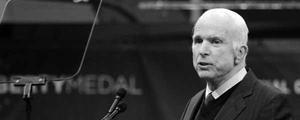The United States has a unique culture of gun ownership not shared by other Western nations. Many Americans believe the Second Amendment provides a constitutionally protected right to own a gun, and thus attempts to restrict the sale or use of firearms are often controversial. Most U.S. states allow citizens to carry concealed handguns in public, provided they do not have a felony record and do obtain a permit. Some states allow citizens to carry concealed handguns if they obtain approval from local law enforcement. Only a handful limits the privilege of carrying a concealed handgun to law enforcement officials.
Those who favor broadening concealed weapon privileges generally argue that the weapons give citizens greater means to protect themselves from violent crime. Opponents typically cite safety concerns, especially if those weapons were carried in public places where there are crowds gathered. A USA Today/CNN/Gallup poll* finds that Americans' views are more aligned with the opponents' position than the proponents' viewpoint -- favoring a limited extension of the right to carry concealed firearms and believing they make the environment less safe for people. Views vary widely by whether people themselves own guns, as well as by gender.
The poll asked Americans which groups of people should be allowed to carry concealed firearms in a public place. The greatest number, 44%, say "only government safety officials, such as police officers" should be allowed to do so. An additional quarter thinks concealed firearm privileges should be extended beyond government safety officials to include those who have a clear need, such as people who transport large amounts of cash as part of their jobs. Only about one in four Americans believe the right to carry a concealed firearm should be extended to any private citizen who does not represent a threat to public safety (such as having a criminal record).
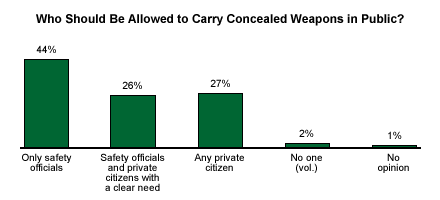
Some basic background characteristics are related to one's views of who should be allowed to possess concealed firearms. Gun owners are much more likely to support broad privileges for carrying concealed firearms than are non-gun owners. Forty-three percent of gun owners believe that any reasonable private citizen should be able to carry a concealed firearm, while 30% believe it should be limited to government safety officials like police officers. In contrast, a majority of non-gun owners (52%) think that only police officers and the like should carry concealed firearms, while only 17% believe any private citizen should be able to carry one.
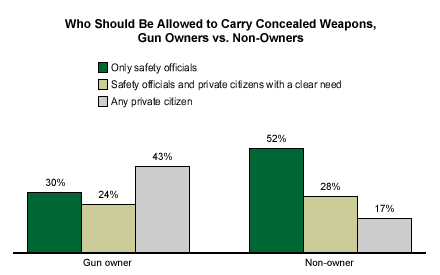
Women's and men's views on concealed firearms diverge greatly. A majority of women, 53%, believe that only government safety officials should carry these weapons, 26% think they should be made available to citizens with clear needs for them, and 17% think any private citizen should be allowed to carry one. Men are more divided in their views, with 37% saying any private citizen should be able to carry a concealed firearm, 26% saying those with a clear need, and 34% only government officials.
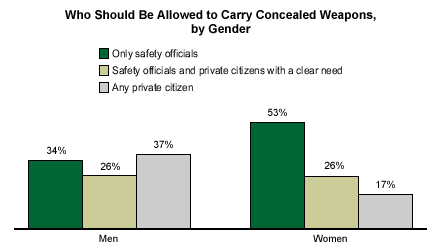
There are slight differences by political affiliation. Fifty-one percent of Democrats say that only government safety officials should carry concealed firearms, compared with 41% of Republicans. Republicans (31%) are more likely than Democrats (18%) to say that any private citizen should be able to carry a concealed gun.
More or Less Safe?
Nearly two in three Americans say they would feel less safe if they were in a public place and knew that concealed firearms were allowed. Twenty-five percent say it would make them feel safer, and 8% volunteered that it would not make any difference to them.
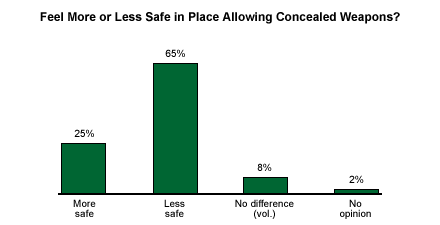
The greatest variation is seen by gun ownership. Forty-three percent of gun owners say they would feel safer if concealed firearms were allowed in a place they were at, while 45% would feel less safe. Among non-gun owners, just 16% say they would feel safer and 75% say less safe.
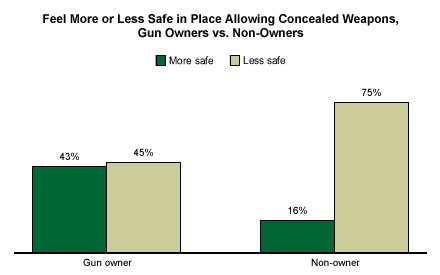
Majorities of men (52%) and women (76%) say they would feel less safe in a place that allowed concealed firearms, but men are more than twice as likely to say they would feel safer (35% to 17%).
Bottom Line
The data suggest that most Americans favor quite restrictive rights on carrying concealed firearms, but in most states the laws are not very restrictive. That disconnect could be because state gun policy might not attract the kind of public attention and scrutiny that more high-profile state issues such as abortion or the death penalty might. It also might be due to the strength of the pro-gun lobby, and perhaps to the fact that these laws have been on the books for a long time and the status quo is difficult to change.
*Results are based on telephone interviews with 1,015 national adults, aged 18 and older, conducted Nov. 19-21, 2004. For results based on the total sample of national adults, one can say with 95% confidence that the maximum margin of sampling error is ±3 percentage points.
